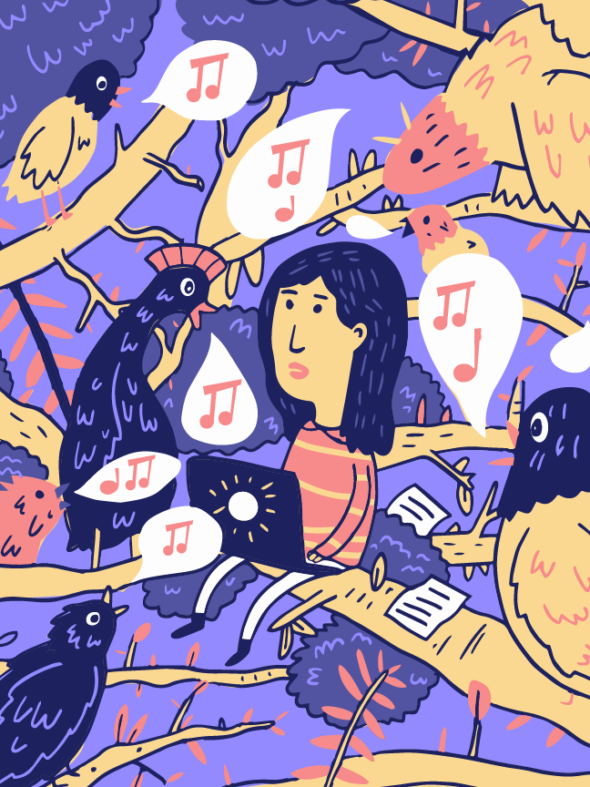When I was a kid, my mom gave me a motivational plaque that hung on my bedroom wall. It read, “Use what talents you possess. The woods would be very silent if no birds sang except those that sang best.” I was an average kid when it came to school, sports, hair and eye color combination (brown and brown), and I thought this was my mom’s way of supporting my mediocrity.

‘Why couldn’t I be a melodic canary in a world of trash crows?’ Illustration by Josh Quick
In my twenties, trying to make it as a professional writer, I grew to resent this sentiment. Why couldn’t I be a melodic canary in a world of trash crows? I didn’t want to be part of someone’s supporting cast, I wanted to be the ONE. And I did think there was only “one.”
But now, with a decade of writing behind me, I’ve been re-examining that quote. I now realize how much it has liberated me to become a better writer. Here’s what I learned:
1. Everything’s already been written
Once you accept this, you can create whatever you want. You don’t have to come up with an idea no one in the history of the planet has already thought of. This does not mean you have permission to steal or plagiarize another artist’s work, but it does mean you can start writing on any topic you feel passionate about. Then, over time, you can find your own way, because no one has your exact experience or your voice. This is what will separate your writing from the rest. That’s all you need to worry about in the beginning.
2. Nothing comes out fully formed
Your first draft will not be good. You won’t uncover your deeper truth. The joke, if it’s even recognizable as a joke, will not be funny. Many people see a finished piece of creative work and never stop to consider how it got there. They are only focused on the polished thing in front of them. But this is not how it works.
When I’m in the depressing first and second draft stages, it helps me to remember I am not alone. Writing is considered a solitary profession, but it’s actually a team of people that are responsible for any one writer’s success. Resources like trusted readers, editors, and champions, provide the feedback that takes a piece from OK to great. And everyone, from Stephen King to Virginia Woolf, has benefitted from these “invisible,” helping hands.
3. There’s a market for weird, niche stuff
One of the first pieces I was ever paid to write was about my love of the 1994 kid-caper movie, The Blank Check. For many years I wrote about deep cut, pop culture moments from the 90s and aughts, on my personal blog. My friends thought it was great! Then one day I found out a publication I liked was accepting submissions and I sent in my piece on a whim. It was a small miracle that they accepted it and I was ecstatic. It validated me to know there was a market for my niche interests and it motivated me to continue pitching my ideas. They don’t always land, but now I know to at least try.
4. But not everyone is going to like or get your weird, niche stuff
One of the great things about being a writer in 2019 is the variety and volume of online publications. Whatever your interest, there’s a good chance someone has built a community around it and often that community has a publishing platform.
So if you submit your work and one editor passes, there’s a chance you can find another one who is a better fit for your content, voice, and style. Remember, personal taste is subjective and every editor has different sensibilities. What isn’t right for one could be right for someone else. But again, how will you know if you don’t try?
5. And your Aunt Carol and online trolls really won’t get your weird, niche stuff
Publishing is not a path to absolute praise. In fact, the more eyes on your writing, the more unsolicited opinions you’ll be subjected to. If it’s posted online, strangers will find a way to get irrationally angry about your dumb Rainforest Café joke. Also, to a lesser, but more personal extent, your Aunt Carol will never understand your satirical comedy “stories,” but she will always ask if it’s about her. That’s okay because you didn’t write it for her (or about her). Stand behind your work, be proud of what you’ve created, and try not to take any of it too personally.
